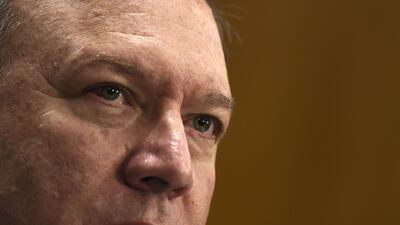Are the United States and Iran preparing to go to war? The prospect has certainly advanced considerably since Donald Trump became president and, particularly, when he withdrew from the Iran nuclear agreement. But there might be less going on than meets the eye.
This was ostensibly in response to a speech by Iranian President Hassan Rouhani saying Washington faces a choice between "the mother of all wars” and “the mother of all peace" when dealing with Iran.
Mr Rouhani’s speech was somewhat obnoxious but by no means unusual. Friends and foes alike agreed that Mr Trump was actually trying to change the subject from his disastrous, universally condemned press conference with Russian President Vladimir Putin, in which he seemed to side with Russia, and not the US, on each and every contentious issue.
If that was his goal, it certainly worked. The master of misdirection finally got everyone talking about something else.
But there is a real context for this heightened anxiety. Having left the nuclear deal, Washington has instituted a campaign of maximal pressure against Tehran, primarily in the form of a massive financial war that is having a decidedly negative impact on Iran's already shaky economy.
Iran already felt threatened and was further alarmed by Mr Trump's tweets and a major Iran-focused policy speech by Secretary of State Mike Pompeo.
Mr Pompeo indexed the malevolent and hypocritical conduct of Iranian rulers and emphasised the contradiction between their policies and the interests of the Iranian people. While the State Department denied he was calling for a regime change, he said Mr Trump would only be prepared to sit down with Iranian leaders if there were "demonstrable, tangible, irreversible changes in the regime".
This combination of financial and psychological warfare has produced a real response from Tehran. Iran's chief regional mischief maker, Major General Qassem Soleimani, told Mr Trump a war would "destroy all you possess", along with other dire, exaggerated threats.
In an effort to demonstrate the diversity of its asymmetrical capabilities, Iran cut electricity supplies to Iraqi provinces, supposedly due to unpaid bills but almost certainly to make a broader point to the West, its allies and Iraqis.
Further, the Iran-backed Houthis in Yemen attacked two Saudi oil tankers in the Red Sea, causing Riyadh to suspend shipments through that crucial waterway, while Iran yet again threatened to seal off the Strait of Hormuz.
In other words, what began as a politically motivated rhetorical turn quickly spiralled into a cascading set of tit-for-tat gestures bringing the parties closer to conflict than they have been in many years.
Yet there's no reason to believe either side really wants an all-out conflict and, apart from reckless words, both are being fairly restrained in deeds.
Mr Trump knows full well that he was not elected to start additional, avoidable, wars. He would only do that if he believed it was absolutely necessary for his political survival.
____________________________
Read more from Hussein Ibish:
Trump's foreign policy surrenders US power rather than leveraging it
'America first' is quickly turning into America alone
Trump is attacking public institutions to de-fang them of their authority
____________________________
Whether or not Mr Pompeo's speech implied that Washington's new policy goal might be regime change in Tehran, that will likely prove a chimera. There is simply no example in modern history of regime change resulting primarily from external pressure, even under far more onerous conditions and with substantially more unrest and alternative potential leaderships than currently exist in Tehran.
Cuba, North Korea, Iraq and Iran itself all suggest that financial and diplomatic pressures alone will only make Iran more impoverished but also more bellicose and angry and probably more unified. The regime may well change but probably not in the way Mr Pompeo wants.
Just to keep us on our toes, midweek Mr Trump suddenly suggested he was open to a "new deal" with Iran. Mr Pompeo has also repeatedly said this is the ultimate goal of Washington's new campaign.
We have entered an extended period of mutual pressure and bluster in which both sides, believing that they are operating from considerable strengths, will seek to harass and isolate each other.
But when the dust settles, unless Iran and America blunder into war, both will realise the limitations of what they can achieve during the current stand-off.
And then we will be back at the bargaining table, possibly beginning with a European overture to Tehran. Iran will return weakened but Washington and its allies still might not get everything they are hoping for.
Much will depend on how much military and strategic pressure Mr Trump is really willing to shoulder. Financial and psychological warfare alone won't achieve much. Unless Tehran soon experiences some serious strategic setbacks, this will prove a considerable and dangerous mistake.
Hussein Ibish is a senior resident scholar at the Arab Gulf States Institute in Washington


